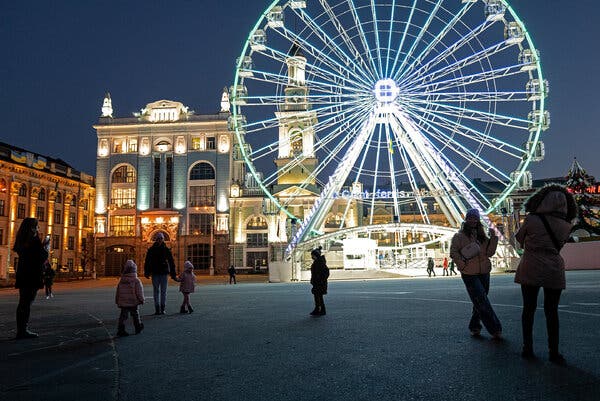KYIV, Ukraine — As President Biden and President Vladimir V. Putin of Russia continue to engage in a perilous pas de deux over the fate of Ukraine, the nation at the heart of the crisis roiling Europe marked a new national holiday on Wednesday: Unity Day.
President Volodymyr Zelensky of Ukraine announced the holiday — an effort to bolster public resolve “in the face of growing hybrid threats, information and propaganda, moral and psychological pressure” — in response to U.S. intelligence assessments over the weekend that suggested that a Russian invasion could begin before dawn on Wednesday.
But after Mr. Putin’s announcement Tuesday that Russia would “partially pull back troops” deployed near Ukraine and seek a “diplomatic path,” there was tenuous hope in Ukraine and across the region for a peaceful resolution to the crisis.
The Russian Defense Ministry continued to announce further withdrawals of troops from near Ukraine on Wednesday, but Western leaders have responded warily, noting that Moscow in the past has moved troops around while leaving heavy weaponry in place.
President Biden, speaking hours after Mr. Putin on Tuesday, said the United States “had not yet verified” Russia’s claims of a pullback, and that U.S. analysts say that more than 150,000 Russian troops near the Ukrainian border “remain very much in a threatening position.” Mr. Biden added that “an invasion remains distinctly possible.”

But he emphasized that the United States would continue to pursue “a diplomatic resolution,” building on two days of signs from both Washington and Moscow that the focus was shifting, at least for the moment, from military posturing to diplomatic wrangling.
At the center of those discussions is the suggestion that Ukraine might drop its ambition to join the NATO alliance — a move that would help fulfill one of Mr. Putin’s key demands. It is a politically charged topic in Ukraine but Mr. Zelensky has acknowledged it is being discussed.
“It seems to me that no one is hiding it anymore,” he said this week.
Germany’s chancellor, Olaf Scholz, was even more direct when he said after meeting with Mr. Putin in Moscow that one way of defusing the standoff would be to acknowledge that Ukraine’s accession to NATO is unlikely to happen.
“Everyone must step back a bit here and make it clear to themselves that we just can’t have a possible military conflict over a question that is not on the agenda,” Mr. Scholz told German reporters in Moscow after leaving the Kremlin.
A central challenge for the United States and its allies has been trying to divine the intentions of Mr. Putin — a former K.G.B. intelligence officer for whom ambiguity and confusion can serve their own ends.
Intelligence picked up by the United States has indicated that Russia was considering Wednesday as the possible date for the start of military action, according to multiple officials briefed on the material.
Those officials, who spoke on condition of anonymity to discuss sensitive information, acknowledged the possibility that the mention of a particular date could be part of a Russian disinformation effort.
While Mr. Putin’s comments on Ukraine have been strategically ambiguous, he has not hidden his view that “true sovereignty of Ukraine is possible only in partnership with Russia,” as he argued in a 5,000-word essay, entitled “On the Historical Unity of Russians and Ukrainians.”
Even the threat of attack has presented serious challenges to Mr. Zelensky’s government. He has announced that $4 billion to $5 billion will be needed to stabilize the economy and hundreds of millions more have been spent to keep its airlines flying after insurers started to pull coverage.
Just as the government tried to tamp down fear over the threat of an imminent invasion, they also approached Moscow’s claims of a pullback with caution.
“We in Ukraine have a rule: We don’t believe what we hear, we believe what we see,” Dmytro Kuleba, the Ukrainian foreign minister said. “If a real withdrawal follows these statements, we will believe in the beginning of a real de-escalation.”


























